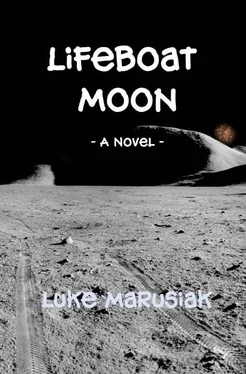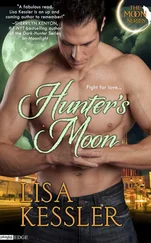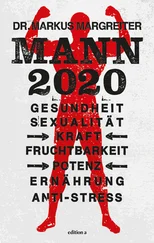“You saw how we pack our spacesuits. We wear anti-static boots and keep Japan Station at high humidity. We ground ourselves with wrist straps when moving from section to section.” Yumi laid out the protocol.
“We never planned on a pure oxygen environment,” Zeke said.
“But they’re right,” Mark answered. “Our air reactors only make oxygen to mix in our internal atmosphere.”
“There’s only trace amounts of nitrogen on the moon,” Zeke said. “We need to figure this out.”
“Would we pressurize the cave with nothing but oxygen?” Mark asked. “Is that really a good idea?”
“We have no choice,” Katsumi answered.
“One spark… it only takes one spark.” Mark didn’t like it. “Maybe we use the remainder of our nitrogen when we first pressurize.”
“Let’s make a plan,” Katsumi replied. “The cave you found is massive. We don’t even know how big it is or how long it will take to pressurize.”
Mark nodded. “There’s a lot of work to do.” He grinned and regretted that Katsumi and Yumi couldn’t see his wide smile behind his helmet visor. “Thank you for this visit. It means so much. We have a good chance at survival.”
Katsumi lifted his hand and pointed to his helmet. Mark saw that Katsumi was again initiating a private exchange and authorized the conversation. “For us to have a good chance,” Katsumi said only to Mark, “you must fix your problem. You have a disease in Moon Base Armstrong. It is a consequence of how NASA and ESA picked their crew. This is why Japan Station is separate. We have no disease.”
“What do you mean?” Mark asked.
“NASA focused on picking crew for the right social mix, not the right mix for the mission. Not the right dedication to make hard choices. JAXA picked crew with ironclad discipline. We can make difficult decisions if necessary. Can you?”
Mark wondered what Katsumi knew of the director’s post gamma ray plan. “Yes, we can make difficult decisions.” Mark rejected the plan’s contingency option of reducing the crew the moment he saw it. He wasn’t going to tell Katsumi that.
There was no way Mark would direct culling the crew down to an essential few. He was stunned beyond description when he first viewed the director’s plans. Using some of his crew for food and fertilizer was something he would never do. Humanity demanded they pull together. Mark would never direct Moon Base Armstrong’s leadership to kill their colleagues.
But Mark thought it possible that, faced with the same choice, Katsumi would. There was a threat in Katsumi’s warning. Future cooperation between Moon Base Armstrong and Japan Station depended on satisfying Katsumi and Yumi. And they were far from satisfied that Mark understood the reason for the pod crash. They came all the way out around the crater to personally ensure their message was received.
“Difficult decisions require unity,” Katsumi said. “We at Japan Station do not see unity here.”
Mark pointed to their moon buggy and noted that Zeke and Habi were having their own private conversation. He turned back to Katsumi. “We’ll finish our investigation and get the answer to the pod crash.” He kept his voice steady to mask his dismay. “The crew of Moon Base Armstrong are good people. There’s no disease.”
“You cannot risk our future on that assumption. You must know and you do not. You must know for us to work together.”
“I will know. We will know.”
Mark drove the moon buggy on a trip that would be the farthest ever travelled from Moon Base Armstrong since the gamma ray burst. The round trip calculations showed the buggy would have to cover just over forty-four kilometers, twenty-two each way. That was the distance to the pod crash site. After the Japan Station team’s seventy-two kilometer round trip, this shorter trip had to be done. They had to finish the investigation and put all doubt to rest.
The moon buggy had a top speed of fifteen kilometers per hour so the journey would take ninety minutes each way and require them to replace air tanks at the crash site. Thad sat beside Mark. Zeke sat in back with the equipment. Mark felt the buggy rise and fall as he guided it over the uneven terrain. The beautiful desolation that so enamored the Apollo astronauts struck Mark as forbidding. The Apollo astronauts knew they’d go home again. They knew the bright blue marble was waiting for them. They knew that, when moon dust fouled their seals and consumables ran low, they’d leave. The loss of earth and the unforgiving vacuum inundated Mark’s mind.
As Mark drove through the bleak landscape his thoughts raced. The myriad of constraints, the asinine contingency plan, the reason for the pod crash; all jockeyed for priority in his head. The air composition constraint was a big problem. The lunar regolith was made predominately of oxides so extracting oxygen was straightforward. But the thought of pressurizing the massive cave with pure oxygen and filling it with electronics and moon manufactured burnable aluminum structures distressed Mark. If they used pure oxygen, they would have to trust their lives to a static electricity protocol that had to be failsafe enough to prevent an infernal-creating spark. That seemed nuts.
Lack of carbon was another problem. Carbon, like nitrogen, was also a trace element. And carbon was life itself. Without carbon they couldn’t grow enough food and couldn’t sustain themselves. Shortage of food was the main trigger for the culling crew reduction contingency plan. Moon Base Armstrong’s crew was slowly switching to Tina’s Agriculture Pod farming of five grown crops: lettuce, potatoes, wheat, rapeseed, and soybeans. Mark cringed at the bland culinary future. Mark had an intense desire for spices, for something of flavor, for a good cheeseburger with all the toppings.
“How’re you doing Mark?” Zeke’s calm and steady voice came through his helmet.
“Fine.”
“Don’t let the dark force of despair win.”
“I’m not.”
“You’re not saying anything,” Thad entered the conversation over their Bluetooth communications.
“I’m trying to get all these details down,” Mark answered. “There’s so much to keep track of.”
“You need our help,” Zeke offered. “The director and the ArmCon always split their duties.”
“That’s right,” Thad added. “It’s like the commander and the executive officer in U.S. Army units. You always need a right hand man.”
“Or two,” Zeke chimed in.
Mark laughed. “If you two are volunteering, you’re hired.” The simple communication from kindred spirits lifted his mood. He opened up to his friends. “Katsumi thinks someone caused this pod crash.”
“Really?” Thad asked. “They think I screwed up?”
“The data indicates a signal caused the pod to lose the lock on your beacons. A signal that caused the crash.”
“A signal?” Thad was fully engaged. “What type of signal?”
“A beacon signal,” Zeke answered. “The data they brought indicates a different beacon signal changed the guidance.”
“Okay,” Thad replied. “But then how come the pod yawed and the thrusters lit? If it just changed landing locations, it would have come down soft.”
“We need to find the pod recorder,” Mark said. “The telemetry stopped as soon as your beacons switched from green to purple.”
Mark kept trying to make sense of the crash. What if Katsumi was right and they did have a disease, someone who signaled the pod? He shook his head and grimaced when sweat from his forehead splattered the inside of his helmet visor. There couldn’t be a disease. There had to be a better explanation. He didn’t know what it was but he expected to find it. He steered the buggy into a gentle right turn and drove toward the backside of Shackleton Crater.
Читать дальше












